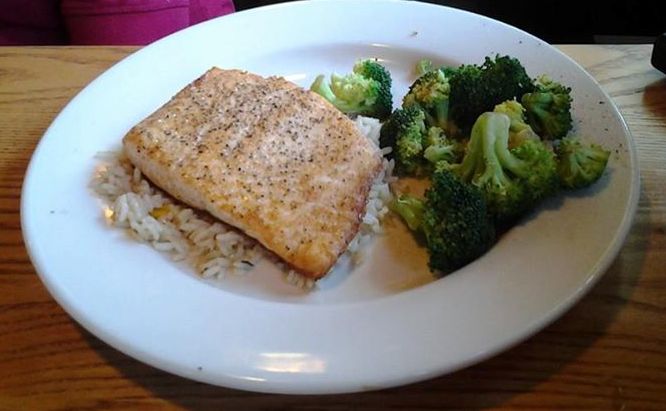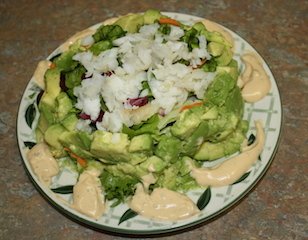fish nutrition
Good for you heart
Easy to prepare
delicious to eat
fish nutrition
get your omega 3 fatty acid
The mayo clinic recommends eating fish for omega 3 fatty acid at least twice a week or supplementing your diet with fish oil. There are so many kinds of fish. Some are mild and some have that "fishy" taste and smell. There is fresh water fish and fish from the sea. There are people who like all kinds of fish and those who prefer mild flavored fish. Who knows, some folks may prefer fishy fish. Fish is a very healthy food. Fish for lower cholesterol is a wise choice.
I still remember my mom serving fish and warning us to watch for small bones. For my little brother, she would rub the fish between her fingers and remove small bones. I lived in fear of choking to death on a fish bone, but it didn't happen. Not all fish is full of small bones, but I always remember this when I eat fish. What I learned later was that some fish did not appear to have this problem. You are probably not going to find fillets with tiny bones. I have yet to eat tilapia fillets and find a bone.
In those days we didn't eat fish for lower cholesterol, because we were not concerned about our cholesterol. Today, we seem to be more aware of nutrition of the food we eat which is a good thing.
fish nutrition and facts
- high protein
- high omega 3
- many vitamins and minerals such as:
Vitamin B-1
Vitamin B-6
Vitamin A
Iron
Magnesium
calcium
selenium
Fish does contain cholesterol, but remember that recent studies have shown that cholesterol in the diet has little affect on blood cholesterol. It should not raise your cholesterol.
How to
Prepare fish
for best nutrition
The healthiest ways to prepare fish are:
- bake
- broil
- grill
- steam
Frying is not recommended. The American dietetic association recommends fatty fish as they are high in omega 3.
Fish nutrition:
- Salmon* - wild salmon appear to be healthier to eat than farm raised salmon
High in Vitamin B6, niacin, and B12. A good source of riboflavin, phosphorus, thiamin, potassium, copper, and iron. very good to help lower cholesterol - mackerel - good source of omega 3 fatty acid and vitamins and minerals
- sardines - healthy but a bit more "fishy" than some others
- black cod - sometimes called sablefish. They may be the same fish. a very fatty fish so good for a diet to lower cholesterol.
- lake trout* - rich in omega 3
- albacore tuna - fresh is best
contains: selenium, vitamins - B, B12, B2, B6, B2, D, phosphorus, magnesium
potassium, choline, and iodine. It is an excellent source of protein and omega 3 fatty acids. Fresh, home cooked is so yummy and healthy - Pollock* - contains selenium, calcium and some iron - wild Alaskan pollock is always
caught in the wild and not farm raised. - halibut - very high in potassium
- snapper - snapper contains vitaminsA, choline, selenium, potassium, It is a healthy fish for weight loss being very low on the glycemic index.
- flounder* - Rich in omega 3 and selenium
- haddock* - vitamins and minerals including B vitamins and phosphorus, iron, magnesium, zinc and calcium.
- tilapia* - a good source of potassium; contains B12, B6, calcium, magnesium and iron
- catfish* - potassium, B12, B6, magnesium and iron
There are many good fish to eat. These are just a few, but some of the most common fish to lower cholesterol.
* These fish marked with the asterisk have the lowest levels of mercury
What about shellfish
Shellfish has gotten a bad name through the years as being unhealthy due to high cholesterol and other reasons. Now researchers are beginning to say that maybe shellfish isn't so bad to add to a healthy diet. The cholesterol in food has been shown not to be the cause of higher blood cholesterol in humans. Perhaps the real culprits are sugar and sodium.
Shellfish are rich in nutrients such as iron, copper and Vitamin B12.
Some good, nutritious shellfish to add to your diet for occasional consumption would be:
- lobster
- shrimp*
- crab
- clam*
- abalone
- mussels
- oysters
- scallops*
Shellfish to be consumed should be grown in clean water and correctly harvested.
Dangerous levels of mercury
Some fish have been found to contain various levels of mercury which can cause serious health problems. For a list of fish which are lower in mercury, see natural resources defense council's page on mercury in fish. There is an asterisk in the lists above showing fish with the lowest mercury. If you worry about the mercury level, you can take a fish oil supplement to get those omega 3s.
The worst fish to eat are shark, swordfish, king mackerel, or tilefish, because they contain high levels of mercury.








